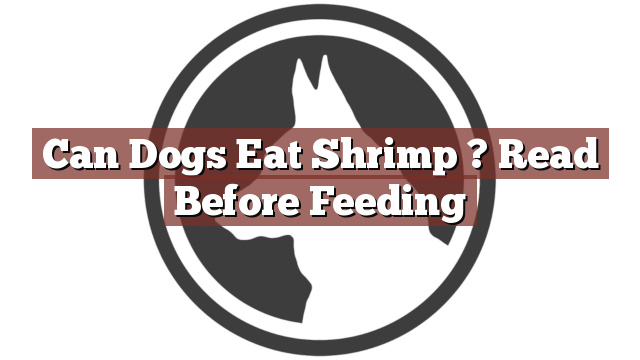Understanding Your Dog’s Dietary Needs
As pet owners, it is crucial to understand our dogs’ dietary needs to ensure their overall health and well-being. Providing a balanced diet is essential to keep our furry friends happy and healthy. While dogs primarily thrive on a diet consisting of high-quality dog food, many pet owners often wonder if they can incorporate other human foods into their dog’s diet. One such question that arises is, "Can dogs eat shrimp?" It is essential to gather the necessary information before feeding your dog any new food.
Can Dogs Eat Shrimp? Read Before Feeding
The answer to whether dogs can eat shrimp is yes. Shrimp can be a healthy addition to your dog’s diet if prepared properly. However, there are a few factors to consider before feeding your furry friend this seafood delicacy. First and foremost, it is crucial to cook the shrimp thoroughly. Raw or undercooked shrimp can contain harmful bacteria or parasites that can lead to food poisoning in dogs. Additionally, you should remove the shell, tail, and head of the shrimp before feeding it to your dog to prevent any choking hazards or digestive issues.
Pros and Cons of Feeding Shrimp to Your Dog
Feeding shrimp to your dog can have its benefits and drawbacks. On the positive side, shrimp is a lean source of protein that can help in muscle development and repair. It also contains omega-3 fatty acids, which promote a healthy coat and skin. Shrimp is low in calories and can be an excellent choice for dogs on a weight management plan. However, it is important to remember that some dogs may be allergic to shellfish, including shrimp. If your dog has never tasted shrimp before, it is advisable to introduce it slowly and monitor for any signs of allergic reactions such as itching, vomiting, or diarrhea. Additionally, shrimp can be high in cholesterol, so it is recommended to feed it to your dog in moderation.
Conclusion: Make an Informed Decision for Your Dog’s Well-being
In conclusion, dogs can eat shrimp as long as it is cooked thoroughly and served in moderation. However, it is important to note that every dog is unique, and their dietary needs may vary. Before introducing any new food into your dog’s diet, it is advised to consult with your veterinarian. They can provide personalized guidance based on your dog’s specific needs and potential allergies. By making informed decisions about your dog’s diet, you can ensure their overall well-being and keep them healthy and happy for years to come.
Thank you for taking the time to read through our exploration of [page_title]. As every dog lover knows, our furry friends have unique dietary needs and responses, often varying from one canine to another. This is why it's paramount to approach any changes in their diet with caution and knowledge.
Before introducing any new treats or making alterations to your dog's diet based on our insights, it's crucial to consult with a veterinarian about [page_title]. Their expertise ensures that the choices you make are well-suited to your particular pet's health and well-being.
Even seemingly harmless foods can sometimes lead to allergic reactions or digestive issues, which is why monitoring your dog after introducing any new food item is essential.
The content provided here on [page_title] is crafted with care, thorough research, and a genuine love for dogs. Nevertheless, it serves as a general guideline and should not be considered a substitute for professional veterinary advice.
Always prioritize the expert insights of your veterinarian, and remember that the health and happiness of your furry companion come first.
May your journey with your pet continue to be filled with joy, love, and safe culinary adventures. Happy reading, and even happier snacking for your canine friend!

